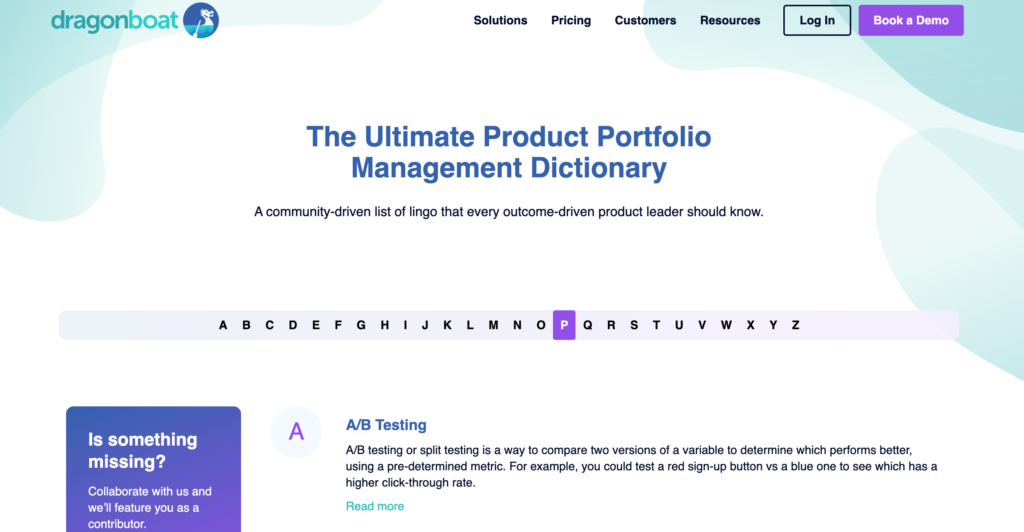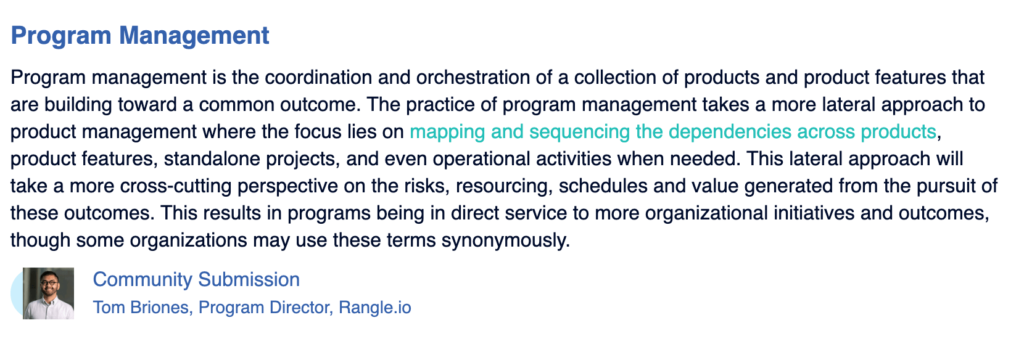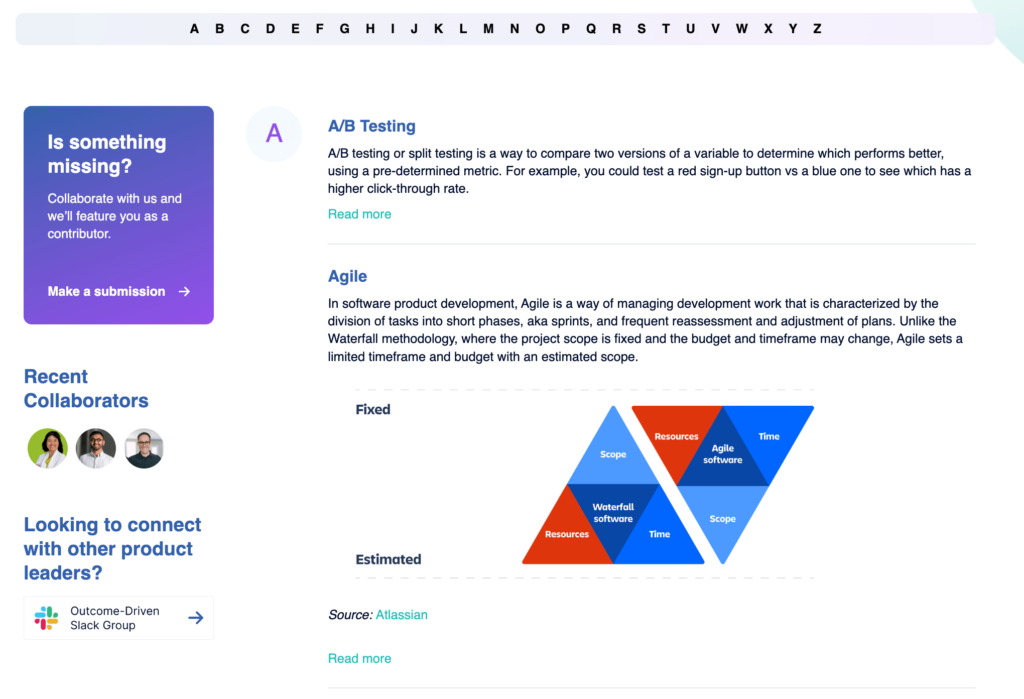MY ROLE: Senior Marketing Manager, Dragonboat.io
COMPLETED: Summer 2022
OBJECTIVE: A new category creator, it’s vital for Dragonboat to continuously create content to educate its target market about its new solution for product teams (a responsive product portfolio management platform) and how it is different from roadmapping tools (existing category).
Our aim was to create an informative dictionary to educate prospects while boosting the rankings of our core group of keywords that we had identified as part of our SEO strategy.
We also wanted to use it as a tool for building up our community of product portfolio management professionals by giving them a way to show their expertise and build up their authority. In turn, they would promote the dictionary by sharing their definitions on social media.
METHOD: Publish a collaborative, community-driven product portfolio management dictionary webpage in the resources section of our website.
We planned to start with an initial list of terms by our team and then add to the dictionary over time, with input from team members as well as crowdsourced terms. We asked the community ie: influencers we had a relationship with, students from our courses, product management professionals, etc. to submit an entry.
Our initial list of definitions was derived from Dragonboat’s primary and secondary keywords, terms from our portfolio management framework (Responsive PPM), as well as terms found within our product itself.
RESPONSIBILITIES:
- Utilized project management tool, Asana, to manage all aspects of the project, from sticking to our timeline to coordinating amongst the multiple people involved
- Created a mock up of how the dictionary should appear and function on the website
- Worked with our graphic designer in Portugal to approve the dictionary’s design and oversee its development in WordPress
- Generate the list of terms to write and publish in the MVP version of the dictionary
- Write and delegate the writing of the terms within the marketing team and with a freelance writer. We were able to source many of the definitions from our own blog, website, and help desk articles
- Reach out to influencers and notable members of our community to submit some entries pre-launch
- Input all of the terms into the WordPress page as well as relevant images and backlinks from within the entries to our relevant blog posts, adding CTAs where relevant
- Create the meta data and featured image for the page and optimize all aspects for SEO
- Publish the page and launch it via social media, within our user community, and in an email newsletter
- Identify opportunities on our website and in our blog to link back to the dictionary or to a specific term within it
- Lead the definitions crowdsourcing effort and monitor our submission form, adding new entries as they are submitted
- Continuously update the dictionary and research new definition/keyword opportunities and review backlinks
RESULTS:
Check out the dictionary here: https://dragonboat.io/resources/dictionary/
Through adding dictionary terms for keywords, we increased the number of times those keywords are mentioned on our website, optimizing it even more. In doing so, we also demonstrated to Google that our website offers valuable information about our offering, product portfolio management, and as such, ours is a website that searchers will find useful.
As the dictionary is only a few months old as of the time of this writing, we still have yet to see how it will help in the long-term to increase our ranking for “product portfolio management.”
However, in the short-term it has proven successful in helping us to forge and strengthen pre-existing relationships with thought leaders and budding professionals in the space.
By making it community-driven, we have had an excellent reason to approach thought leaders and potential partners, offering a mutually beneficial way to help promote themselves and open the door for a conversation for further collaboration opportunities.
For example, a well respected podcaster, instructor, and author in the product management space, Melissa Perri, contributed a definition that’s in line with our philosophy that also comes from her book, “Escaping the Build Trap”:
The dictionary also provided us a way to re-engage past students of our responsive product portfolio management courses and members of our Slack community:
We utilized the left side bar to promote our Slack community and encourage readers to submit their own definitions.
A way that we planned to grow the dictionary is to offer members of our community a free t-shirt for their submission and make it easy for them to share it once its live on social media.
KEY TAKEAWAYS:
By creating an SEO dictionary, Dragonboat:
- Enhanced its position as a leader in product portfolio management and reaffirmed it to Google’s crawler
- Developed an easy way to re-purpose and leverage existing content (turning quotes and ideas from blog posts into dictionary terms)
- Created a vehicle to engage with thought leaders, providing them a quick and easy way to promote their subject knowledge and personal brand
- Added keyword rich and dense content to our website that will help to increase our topic authority over time
- Stimulated engagement within our community of responsive product portfolio management professionals





